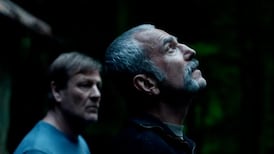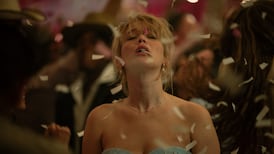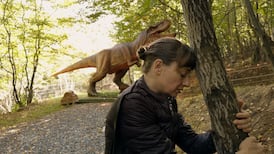And now the weather. The morning will be overcast, with heavy bursts of pathetic fallacy moving in during late afternoon. Expect thunder, lightning, torrential rain and hailstones the size of monkey skulls. You need look to King Lear for comparable levels of climactic sympathy.
There is unquestionable evidence of talent in this exhaustingly morose debut feature from Ronan Day-Lewis. (That name rings a bell.) As one might expect from a man who has already made a name in “punk romantic” art, Anemone, shot in oily nature shades by Ben Fordesman, is filled with images striking enough to justify gallery exhibition. A giant fish floats by in wounded grace. The camera pulls way back as the two leads are, through the now vacant fourth wall of a giant doll’s cottage, revealed dancing in mad despair. All this at the expense of momentum or cohesion.
It is nice to see Day-Lewis pay apparent homage to Andrei Tarkovsky and Terry Gilliam, but those ostentatious flourishes cannot conceal the script’s persistent shallowness.
The film does, as you will no doubt be already aware, have a reliably diligent performance from the director’s father at its heart. Daniel Day-Lewis, returning to acting after an eight-year hiatus, and Sean Bean, almost equally strong, play Ray and Jem, two brothers, former squaddies, meeting up in a Brothers Grimm forest some years after serving in the Troubles. (Early reports suggested the film was set in the late 1980s, but a glimpse of the Jesus and Mary Chain’s album Stoned & Dethroned confirms it as no earlier than 1994.)
READ MORE
Ray fled his then-pregnant wife, Nessa (Samantha Morton), after failing to process his guilt at doing a very bad thing in the vicinity of south Armagh and now lives off sardines in his rugged northern shack. Jem, who took up with Nessa and raised her son to young adulthood, seeks his sibling out when the lad slips into combative depression. You know? Man hands misery on to man and all that.
What follows is a series of often overwritten, always overwrought monologues punctuated by visual extravagances, each scored to Bobby Krlic’s surging postrock, that at best square that Tarkovsky-Gilliam circle and at worst suggest videos for a forgotten 1990s goth band.
The scene that has a mad-haired woman float menacingly at the base of Ray’s bed could only better emulate the latter if the words “The Nihilistic Archangels” were displayed in MTV chyron at the base of the screen.
Amid all this formless mayhem, Daniel Day-Lewis, who wrote the script with his son, manages to construct yet another impressively fleshy character. As ever, the voice is extraordinary: a sometimes thin, always edgy Yorkshire burr that has almost nothing in common with his sub-John Huston boom in There Will Be Blood. He has great fun with an early bit of anti-clerical scatology that features the sole (admittedly black) levity in an otherwise humourless film.
[ Daniel Day-Lewis ends retirement from acting to star in son’s filmOpens in new window ]
Viewers in Ireland may be more uneasy about his monologue concerning the unlikely very bad thing he did in the North. “They were better equipped than we were,” he says of the IRA. There is nothing offensive here, but it feels a tad glib to dip so hastily into untethered miseries.
No sensitive person watching Anemone could fail to be intrigued about where Ronan Day-Lewis will go next. This grandiose, inventively operatic project is no ordinary film. But it is not quite a good film either. Too monotonous. Too self-regarding. Showy to the point of meretriciousness. And, dear lord, the weather! Every important pronouncement is heralded by a burst of distant thunder. The Book of Revelation ends with less inclement precipitation. Perhaps Ronan’s next step should be towards gothic horror.
In cinemas from Friday, November 7th















